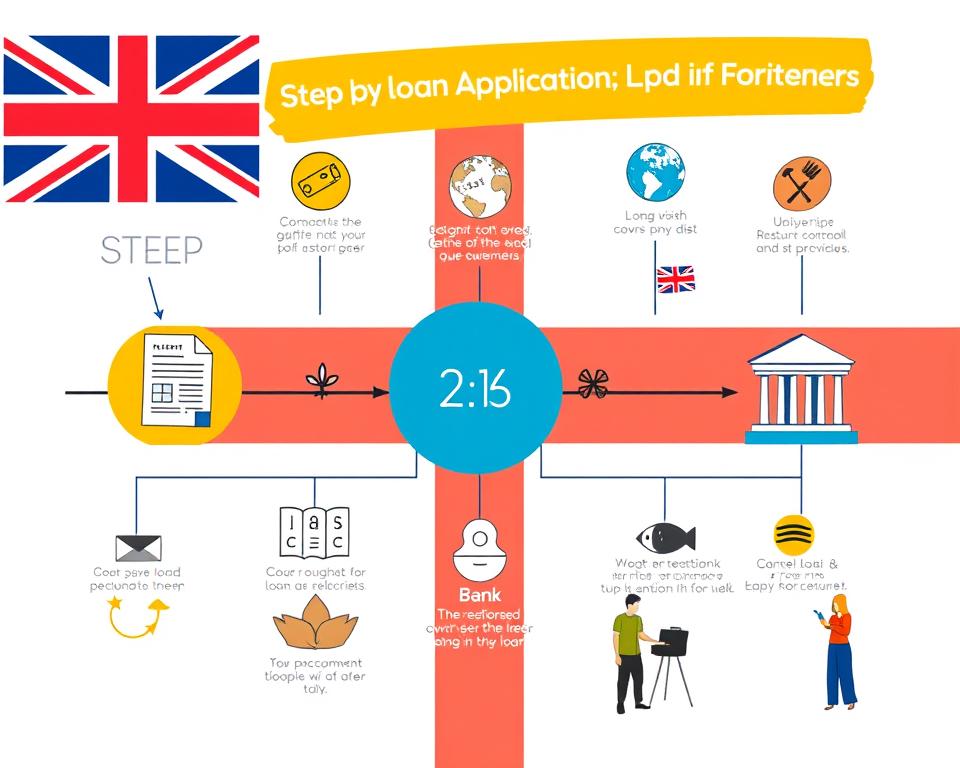Did you know over 600,000 foreigners get loans in the UK each year? This shows the UK is open to foreign borrowers. If you’re looking to get a loan in the UK, you’re in the right spot. This guide will help you understand the loan process for foreigners in the UK.
We’ll cover important topics like the types of loans, who can apply, and what documents you need. We’ll also share tips for getting your loan approved. With the right info, you’ll be ready to tackle the loan process as a foreigner in the UK.
Understanding the Loan Landscape in the UK
Knowing the UK loan landscape is key if you’re thinking about borrowing in the UK, especially if you’re not from here. The lending scene is shaped by many things. These include the type of lender, the loans they offer, and the rules they must follow.
In the UK, you can find lenders from traditional banks to new finance providers. They all offer different types of loans in the UK. You might see personal loans, mortgages, and business loans. Each loan has its own interest rates and how you’ll pay it back. Knowing these details helps you pick the best loan for you.
Interest rates can change based on the market and how risky it seems to lend to foreigners. It’s smart to watch these trends if you’re looking to get a loan. Also, rules for foreign borrowers can affect if you can get a loan and what it will cost. So, it’s important to know how these rules might change your loan experience.
Learning about the types of loans in the UK, their risks, and how they fit into the bigger picture will help you make smart money choices.
Types of Loans Available for Foreigners
Finding the right loan can be tough for foreigners in the UK. Knowing the different loan options can help a lot. It’s key to understand the common loan types, like unsecured and secured loans.
Unsecured loans don’t need collateral, making them easier to get but with higher interest rates. They’re good for smaller amounts and short-term needs. On the other hand, secured loans need collateral, like property, which can lower interest rates but risks losing the asset if payments aren’t made.
Foreigners can look into specialized UK foreign loans made for non-residents. These might come from banks or alternative lenders, tailored for foreign nationals’ financial situations.
When looking at loan types in the UK, think about the pros and cons. Unsecured loans are quick but might have stricter rules for non-residents. Secured loans offer lower rates and bigger amounts but come with risks. Pick the one that fits your financial situation and future plans.
Loans for Foreigners UK
Knowing your financing options in the UK can empower you. Whether you need personal loans or mortgage options, the UK has many choices. This section will guide you in making smart financial decisions.
Personal Loans
Personal loans offer flexibility for various needs, like debt consolidation or big purchases. You can borrow from £1,000 to £25,000. Interest rates depend on your credit score and the lender’s rules.
Some lenders might offer better deals if you have a UK credit history.
Mortgage Options
Understanding mortgage options is key if you’re buying property. You can choose from fixed-rate or variable-rate mortgages. Most lenders ask for a 25% deposit, but some may accept less under certain conditions.
It’s important to find lenders that help foreign buyers. They often have special packages for you.

| Loan Type | Typical Amount | Interest Rates | Deposit Requirement |
|---|---|---|---|
| Personal Loan | £1,000 – £25,000 | 6% – 20% | N/A |
| Fixed-Rate Mortgage | Varies | 2% – 5% | 25% minimum |
| Variable-Rate Mortgage | Varies | 1.5% – 4% | 25% minimum |
Eligibility Criteria for Foreign Borrowers
Understanding the loan eligibility criteria in the UK is key for foreign borrowers. These criteria help lenders evaluate the risk of lending to you. Meeting these requirements can improve your loan approval chances.
Factors Influencing Eligibility
Several important factors affect your loan eligibility. These include:
- Credit History: A good credit score is crucial. Lenders check your credit history to see if you pay back loans on time.
- Income Verification: Showing a steady income helps lenders see if you can repay the loan.
- Employment Status: Having a steady job shows financial stability, which is good for lenders.
Common Documentation Requirements
Having the right loan application documents is essential. Here are some common ones:
| Document Type | Description |
|---|---|
| Proof of Identity | A valid passport or national ID card. |
| Residency Status | Documents proving your legal residency in the UK. |
| Financial Statements | Recent bank statements to show your financial health. |
| Employment Letter | A letter from your employer confirming your position and income. |
Preparing Your Application
Getting your loan application right is key to getting the funds you need. First, check your credit score. A good score can really help you get a loan. Knowing your credit score is the first step.
Then, collect all the documents you need for your loan application. This list usually includes:
- Proof of income (e.g., pay stubs, bank statements)
- Identification (e.g., passport, driver’s license)
- Financial statements (e.g., assets, liabilities)
Ensure all your documents are up-to-date and show your true financial situation. A clear and honest presentation to lenders shows you’re serious about the loan.
It’s also important to clearly state why you need the loan. Whether it’s for a home upgrade, education, or a business, explaining your purpose builds trust with lenders.
Here are some tips for loan application:
- Double-check that you have all required documents.
- Provide truthful and coherent information.
- Be proactive in addressing any concerns the lender may have.
Being well-prepared can make a big difference. Show lenders you’re a reliable borrower, and you’ll have a smoother application process.
Step-by-Step Loan Application Process
Applying for a loan in the UK can be tough, especially for foreigners. It’s important to focus on two main things: picking the right lender and getting the right documents.
Choosing the Right Lender
Finding the right lender is the first big step. Start by looking for lenders that help foreigners. Check their reviews and ratings to see if they’re trustworthy. Look at the terms and conditions they offer, as they can differ a lot.
Consider things like:
- Interest rates
- Loan amounts
- Repayment terms
- Fees and charges
Knowing this information helps you make a good choice. Don’t be afraid to ask lenders questions to make sure they fit your needs.
Obtaining Necessary Documentation
After picking a lender, you need to get the right documents. This includes proof of who you are, how much you earn, and your bank statements. Be ready to talk to your lender a lot during this time. They might ask for more info or clarify things.
Here are some tips:
- Check what documents your lender needs.
- Keep your documents in order.
- Save copies of everything you send.

Understanding Interest Rates and Fees
When you’re looking at loans, it’s key to know about loan interest rates and fees. These things can really change how much you’ll pay back. They’re a big part of UK loan costs and your financial plan.
Interest rates for loans from abroad depend on a few things. Your credit score is very important. Lenders look at it to see if you can pay back the loan. Also, the market can change rates because of the economy or new rules.
Don’t forget about the fees for foreign loans too. You might see fees like:
- Application fees
- Valuation fees
- Early repayment charges
Knowing these costs helps you plan your budget better. It keeps you from getting surprised by extra expenses. Here’s a table with common UK loan costs for different loans:
| Loan Type | Interest Rate (%) | Application Fee (£) | Valuation Fee (£) | Early Repayment Charge (%) |
|---|---|---|---|---|
| Personal Loan | 6.5 – 15.5 | 100 – 300 | N/A | 1 – 5 |
| Mortgage | 2.5 – 4.5 | 250 – 1,000 | 200 – 600 | 1 – 3 |
| Business Loan | 7.0 – 12.0 | 150 – 500 | N/A | 1 – 3 |
Knowing all this helps you make better choices about loans. It’s a smart way to handle your finances.
Tips for a Successful Loan Approval
Getting a loan as a foreign borrower can be tough. But, using the right tips can help a lot. First, check your credit score. A good score makes lenders trust you more. If your credit is new, show you’re reliable in other ways.
Having a clear financial plan is key. Make a detailed budget that shows your income, spending, and savings. This shows you can handle a loan responsibly. Being clear and organized makes your application stand out.
Talking to lenders is important. Tell them about any changes in your finances. This shows you’re responsible and open. Answering their questions quickly shows you’re willing to work together.
Here are some tips to improve your loan application:
- Make sure all your documents are right and complete.
- Know what your loan agreement says.
- Be ready to talk about your financial history.
- Show you have a steady income.
- Think about getting help from a financial advisor who knows about foreign loans.
By following these tips, you can feel more confident when applying for a loan. These strategies can help you get a better result when looking for a loan in the UK.
Conclusion
Understanding loans in the UK as a foreigner is possible with the right info. This guide shows that knowing your options can make a big difference. Whether it’s personal loans or mortgages, being informed is key.
Before applying for a loan in the UK, it’s crucial to know what you need. Knowing the eligibility criteria and required documents helps a lot. Being well-prepared increases your chances of getting approved and boosts your confidence.
This article has given you the tools to apply for loans with confidence. With the right preparation, you can achieve your financial goals in the UK. So, go ahead and make your financial dreams a reality.



